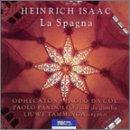| All Artists: Spanish Anonymous, Giovanni Maria Trabaci, Heinrich Isaac, Luzzasco Luzzaschi, Francisco de la Torre, Rocco Rodio, Antonio de Cabezon, Diego Ortiz, Hans Kotter, Paolo Da Col, Liuwe Tamminga Title: Isaac: La Spagna Members Wishing: 0 Total Copies: 0 Label: Bongiovanni Release Date: 2/25/2003 Album Type: Import Genres: Dance & Electronic, Special Interest, Classical Styles: Opera & Classical Vocal, Chamber Music, Historical Periods, Baroque (c.1600-1750), Classical (c.1770-1830) Number of Discs: 1 SwapaCD Credits: 1 UPCs: 675754583828, 8007068560721 |
Search - Spanish Anonymous, Giovanni Maria Trabaci, Heinrich Isaac :: Isaac: La Spagna
 | Spanish Anonymous, Giovanni Maria Trabaci, Heinrich Isaac Isaac: La Spagna Genres: Dance & Electronic, Special Interest, Classical
|
Larger Image |
CD Details |
CD ReviewsWonderful Program of Wonderful Music... Giordano Bruno | Wherever I am, I am. | 10/30/2007 (3 out of 5 stars) "...but less than wonderfully performed. I'm sorry to have to disagree with Mr. Josquin (the previous reviewer). I had very high hopes for this CD, but I doubt I'll ever listen to it again. Those who are disposed to say that all Renaissance music sounds alike are requested to stay away from this disk, lest their fallacious prejudice be confirmed. The tempi, both instrumental and choral, are slugglish throughout and monotonously uniform. Paolo Pandolfo, the gambist, seems unaware of many of the possibilities of his instrument for variety of articulation and tone. The choir sings vowels, not words. The choral attacks are imprecise. The choral sound is somber, billowy, pillowy... just the kind of churchy rumble that renders none of the structure of polyphony audible. ***Three stars for noble intentions***" A valuable recording of music by Heinrich Isaac Sator | Sydney, Australia | 08/04/2005 (5 out of 5 stars) "The recording by this Italian early music group is focused around music based on the La Spagna theme. The La Spagna theme is introduced at the start of the recording but the centerpiece of the whole program is really the World Premier Recording of the Missa La Spagna by Heinrich Isaac (c1450 - 1517)- although the sanctus of the Mass (also known as 'La Bassadanza') was once previously recorded by David Munrow. The Italian connection comes from the fact that the manuscript gives us the place and date of Florence, 1506. Not only that but Isaac married an Italian woman and had a life long affection for Florence. In addition the recording includes to two outstanding (though previously recorded) motets by Isaac - Tota pulchra es and Quis dabit capiti meo aquam. The sections of the Mass are further interspersed with Trabaci's Canto fermo secondo on the La Spagna theme played on the organ of the church of San Martino in Bologna, along with further instrumental pieces by De la Torre (the Alta from the Cancionero de Palacio), reçercada by Luzzasco Luzzaschi, Rocco Rodio, Cabezón, Ortiz and Kotter's Kochersperger Spanieler.
The all male vocal group Odhecaton takes its name from "Harmonice Musices Odhecaton", the first musical publication entirely dedicated to music and published in Venice by Ottaviano Petrucci, the inventor of printed music, and which means one hundred songs. Their repertoire encompasses the creative outputs of Italian and Flemish composers who were active in Italy between the Quatrocento and the Cinquecento, widely represented in publications by Petrucci. Odhecaton joins the ranks of other Italian groups specializing in the performance of early music such as Concerto Italiano. All performance are grounded on thorough musicological research. Although in an age still dominated by English early music choirs, Odehecaton may still only be appreciated amongst early music circles, they deserve far wider recognition. All of their releases have had received gushing reviews in Goldberg early music magazine from both English and Continental reviewers in a rare show of international unanimity. Ivan Moody wrote: "A fine disc indeed: Bongiovanni should encourage further recordings of this repertoire from Odhecaton and friends with the greatest possible urgency." Ivan Moody also thought that the two Isaac Motets here deserved comparison with previous recordings of them by Pro Cantione Antiqua - high praise indeed. It is wonderful that the Italians are rediscovering their place in the world of Renaissance music and Odhecaton deserves comparison with the finest male vocal groups such as Pro Cantione Antiqua and the Hilliard Ensemble. The performances here are all fairly solid, although listening to the older recording of part of the Mass by David Munrow suggests that this performance is surpassable. The recorded sound is very good though slightly over-resonant. Overall this release has to be welcomed for the commitment of the group and the new ground they cover. Other recordings, by the Tallis Scholars and Ensemble Officium provide far more powerful advocacy on behalf of this truly visionary composer but this is stlll highly recommended." |

 Track Listings (20) - Disc #1
Track Listings (20) - Disc #1